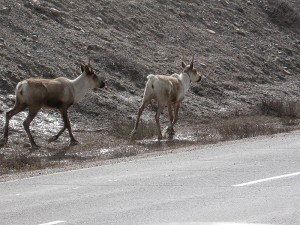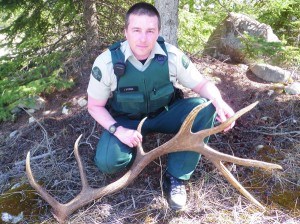
Roadside buffet
Spring is in the air and fresh growth in the valleys brings out hungry wildlife of all shapes and sizes. As things tend to green up quickly along our roadsides, spring means being extra vigilant when driving our park roads.
By staying alert and respecting the reduced speed zones, you will not only help protect animals like bears, elk, sheep and wolves, you may also be rewarded with opportunities to see them in the wild.
Have you ever seen a caribou in Jasper?
Slow down in the Sunwapta Falls to Beauty Flats area on Highway 93 (70 km/hr zone) and you might just catch a glimpse. As of last week, at least one of the last eight Brazeau caribou was near the road. In spring, caribou (a species at risk) will come down into the subalpine forest to feed on fresh vegetation after a long winter of digging for lichens under the snow.
Down the Sunwapta Valley, that subalpine forest drops right down to Highway 93.
Please respect the reduced speed zones to protect caribou and other wildlife enjoying the spring roadside buffet.
Care about caribou?
Caribou are an important part of the mountain national parks, and your support and actions can make a difference for them.
Want the inside scoop on what is happening with Jasper’s caribou herds and Parks Canada’s caribou conservation actions? Become a Caribou Ambassador this summer. Through training and face to face meetings with the Jasper caribou team, get a behind the scenes look at work taking place on the ground in the park and learn more about these amazing animals.
All you have to do in return: share that information with others. Spend time at one of the trailheads that leads to caribou habitat and talk to visitors, head out on the trails as a trail host and experience first-hand the awe-inspiring landscapes caribou call home, or volunteer your time at a special event to help spread the word about these iconic animals and other species at risk in Jasper.
For more information on caribou conservation in the mountain national parks, visit www.pc.gc.ca/caribou. To get involved contact [email protected].
Tips, tricks and regs with Park Warden Joe Storms: antler season

The snow is gone! Well, at least in the valley bottom. With the snow all but recessed to the upper elevations, it is now easier to move around in the valley. Leaves have yet to emerge and visibility for seeing animals and other interesting things is great right now.
Like many other folks who visit Jasper, I like to explore and discover unique areas. During these forays, I often come across antlers and bones. Late winter and early spring is when most antlered animals drop their antlers and they are abundant on the valley floor at this time. Interestingly, they become more difficult to see later in the summer.
Antlers have monetary value. They are used in jewelry, baskets, and crafts and as decorations. Discovering these items can be thrilling, especially if they are from a large or unusual specimen. Recent news followers may have heard about the ram horns of potential world record size found in the province. While it may be OK to keep those found near Hinton, it is prohibited in the park. Antlers and horns, like everything else in the park, are protected. This ensures that they remain not only for others to discover, but that they remain as part of important natural processes; antlers provide an important source of minerals for small animals.
Now here is a whopper of a fine: trafficking in wild animals (the first time) means a fine of at least $4,000, but can be up to $225,000 and could include six months of jail time!
Depending upon the severity and if this is not the first time, fines can be from $800,000 to $10,000,000. This does not even include aggravating factors. Yes, there are a lot of zeros and no, it is not a typo!
This should be incentive enough to leave things alone.
“Wait a minute... antlers aren’t animals.” Actually, the definition of wild animal in this case includes living or dead, at any developmental stage, and any part or derivative. This means antlers. Trafficking means to sell, solicit, exchange, give, and other forms of interaction.
So, collecting park antlers and handing them over to someone else is actually trafficking.
“But I am not selling anything; I just found an antler and plan on taking it home.” The law here is a little bit more lenient and a first offence for a lesser crime is only a fine up to $25,000. That still hurts though.
When in doubt, go find out. For any adventure, the park information centre is a great place to begin to find out the latest information and conditions. Also, Park Wardens are here to assist you—we are not just looking for bad guys.
Park Wardens, the RCMP and Jasper Bylaw officers work to ensure the safety of residents and visitors alike. Laws are in place for everyone’s safety and for the protection of this valuable place. I believe that we all consider Canada’s national parks as special places to protect. With your participation, you can contribute to the protection of this park and quite possibly even prevent poaching.
Help protect the park and park users by contacting the Warden Service to report a violation or situation you feel is not quite right. The 24-hour contact number is 780-852-6155 or toll free at 1-877-852-3100, or email [email protected]. For more information on Jasper National Park regulations, visit http://www.pc.gc.ca/jasper.
Parks Canada
Special to the 51����
